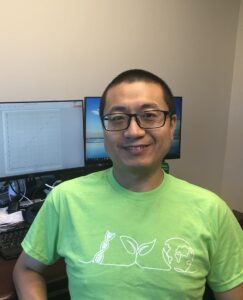Honghe Sun is a graduate student working on a PhD in Dr. Zhangjun Fei‘s Lab at Boyce Thompson Institute. The focus of his work is genomics.

Honghe Sun checking watermelon chromosome synteny
What is your hometown?
Liaoyang, Liangning Province, China
What is your favorite crop?
Watermelon.
Introduce yourself—your background, where you are now, and your current research focus.
I’d been a visiting student in Dr. Zhangjun Fei’s Lab for five years and was involved in the genome assembly and population resequencing projects of watermelon, Cucurbita maxima, Cucurbita moschata, and other plants. Currently, I am a 3rd-year Plant Biology Ph.D. student at Cornell University, focusing on sequencing-based genomics studies in cucurbits in this lab.
Why did you choose to work with cucurbit genomics?
I entered this field in the first watermelon genome assembly project, and recognized the power of bioinformatics in the following projects that I participated in. Through various applications of genomics, I built an interest in the genome evolution and domestication of cucurbits. I believe the outcome of these studies will help breeding programs a lot.
What do you hope to accomplish during your time working on the CucCAP grant, and what do you most look forward to in this position?
I hope to identify agronomic traits-related genes and variants comprehensively through constructing a graph-based pan-genome covering the Citrullus genus.
Please provide a brief description of your research.
Reference-grade genomes will be developed for all 7 species of Citrullus genus, which includes the cultivated watermelon (Citrullus lanatus subsp. vulgaris). These high-quality assemblies will allow us to construct a genus-scale graph-based pan-genome and capture a variation map, including SNPs and structural variants (SVs), by integrating whole-genome resequencing data from a broader population range. I will apply comparative genomics, selective sweep, and association analyses to identify genes and variants associated with traits of interest, and explore insights into the evolution of watermelon.
